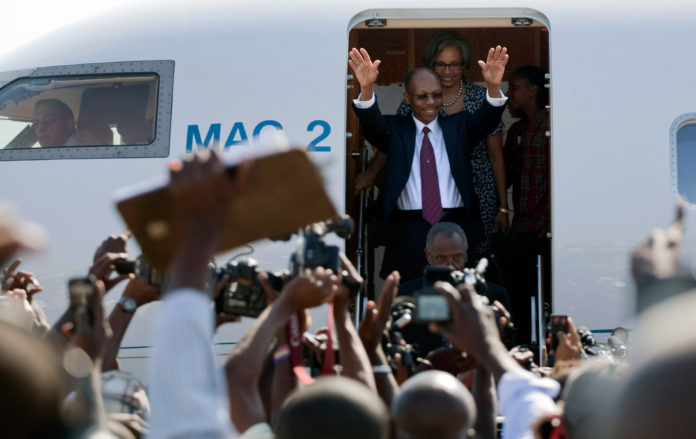
(Français)
Konplo Aristid la (The plot against Aristide)
Li soti Washington (It came out of Washington)
Li pase Vatikan (It passed through the Vatican)
Se Bondye ki voye-l (It was sent by God)
Manno Charlemagne
On Jul. 15, 2011, former Haitian president Jean-Bertrand Aristide turned 58. His birthday was marked in Haiti and its diaspora by scattered celebrations of members and sympathizers of the Lavalas Family (Fanmi Lavalas), the party he founded in 1996.
During the seven years he spent exiled in South Africa after the 2004 coup d’état against him, Aristide’s birthday was commemorated by large demonstrations in the streets of Port-au-Prince calling for his return. Over the past 25 years, first as a liberation theology-inspired Salesian priest in the 1980s and then as Haiti’s twice elected (1990, 2000), twice deposed (1991, 2004) President, Aristide had become a symbol of the Haitian people’s demands for justice, democracy and sovereignty. He received a spontaneous hero’s welcome from thousands when he finally returned to Haiti on Mar. 18 aboard a private South African jet. Much to the dismay of the Haitian elite and foreign powers which overthrew him, he remained then, and remains now, enduringly popular.
But since returning to Haiti, Aristide has ventured out from his home in Tabarre only once, due to concern over the threat of attacks on him and his supporters. Newly installed right-wing president Michel Martelly has, in the past, made no secret of his antipathy for Aristide. He recently cut back Aristide’s security detail and took back the government vehicle which former President René Préval had provided Aristide on his return.
In a falsely magnanimous gesture, Martelly recently suggested he would grant Aristide an “amnesty” (which he proposed also for recently returned former dictator Jean-Claude Duvalier), although Aristide has never been charged, much less convicted, of any crimes whatsoever.
the U.S. State Department was pushing for Aristide’s removal from power in February 2004 and strongly opposed his eventual return in March 2011.
That may soon change. Right-wing mouthpieces like former International Republican Institute (IRI) agent Stanley Lucas, pro-coup historian Michel Soukar, and former anti-Aristide opposition spokesman Sauveur Pierre Etienne have all recently taken to the airwaves in Haiti and its diaspora to call for Aristide’s prosecution with lurid and far-fetched charges of corruption and political murder.
Haïti Liberté has also learned from protected sources that a U.S. government team is investigating Aristide (not for the first time) to see if it can concoct a credible human-rights case against him.
This comes as no surprise. In reviewing some 1,918 secret Embassy cables from April 2003 to February 2010 procured by the media organization WikiLeaks, Haïti Liberté unearthed a behind-the-scenes look at how the U.S. State Department was pushing for Aristide’s removal from power in February 2004 and strongly opposed his eventual return in March 2011.
But Washington feigns neutrality. A U.S. Embassy spokesman in Haiti told Haïti Liberté after a press briefing last Nov. 23 that Washington had no position on Aristide’s return to his country. “Aristide’s return? That’s a Haitian question, that’s a Haitian decision,” said Jon Piechowski.
“So the U.S. would have no say in that. . .”
“No,” Piechowski responded, “I think whether Aristide stays where he is or comes back to Haiti, that’s between him and the people of Haiti.”
The secret U.S. diplomatic cables show those statements are unequivocally false. The cables not only bolster existing evidence of U.S. involvement in the 2004 coup, but portray a sophisticated, globe-spanning campaign afterwards to marginalize Aristide and imprison him in exile.
When Aristide himself or officials from Caribbean nations like the Bahamas talked of his rights, the United States flexed its diplomatic muscles to oppose them. On one occasion, a U.S. ambassador went so far as to angrily “pull aside” and scold the Dominican Republic’s President.
The cables show how Washington actively colluded with the United Nations leadership, France, and Canada to discourage or physically prevent Aristide’s return to Haiti. The Vatican was a reliable partner, blessing the coup and assisting in prolonging Aristide’s exile.
The cables also show continuity between the policies of the Bush and Obama administrations toward Aristide. Under Bush in 2004, a U.S. Navy SEAL team escorted Aristide on a jet into exile in what Aristide called a “a modern-day kidnapping.” Six years later, when Aristide announced his desire to return and help after the devastating 2010 earthquake, Obama’s diplomatic corps mobilized to block him. Obama himself called South Africa’s President in a desperate failed attempt to keep Aristide off the jet that finally flew him home.
More than two decades after Aristide first became President, Washington’s campaign against him continues. Its last big victory was the 2004 coup d’état, where we begin with the intimately detailed information contained in the WikiLeaks cables.
Bahamas shows “sympathy” and complains U.S. is “hard-minded”
The trove of Embassy communications obtained by WikiLeaks unfortunately does not include many cables from the Port-au-Prince embassy until March 2005. However, secret cables from the neighboring archipelago nation of the Bahamas during 2003 and 2004 clearly show Washington’s hostility toward Aristide.
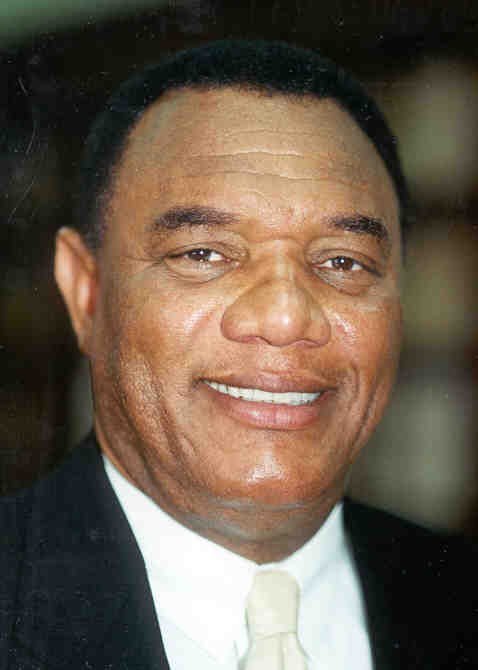
The very first cable of those which WikiLeaks provided to Haïti Liberté is one from the U.S. Embassy in Nassau on Apr. 17, 2003. In it, U.S. Ambassador J. Richard Blankenship reports about a meeting where Bahamian Foreign Minister Fred Mitchell “described the U.S. position on Haiti as ‘hard-minded’ , and called for continued dialogue.”
Washington, at the time, had sought to invoke a clause of the Organization of American States’ interventionist “Inter-American Democratic Charter” in an attempt to find some pseudo-legal leverage to remove Aristide. But “Mitchell was dismissive of the possibility of invoking the democracy provisions of the OAS Charter, saying that although ‘Some people argue that’s the case in Haiti … I think that is taking it a little bit too far,’” the cable said.
Washington was aware that the government of Bahamian Prime Minister Perry Christie was working to shore up the besieged Aristide government, and Blankenship sarcastically concluded his message: “While The Bahamas will remain engaged on Haiti, the Christie government will resist any effort to put real teeth into any diplomatic effort to pressure President Aristide, preferring (endless) conversation and dialogue to the alternative.”
There is another cable from the Nassau Embassy’s Chargé d’Affaires Robert M. Witajewski dated Feb. 23, 2004, about a year later and one week before the coup. At a Feb. 19 event, “Prime Minister Christie twice came to the Charge’s table to request an ‘urgent’ meeting,” Witajewski wrote. After the meeting which was held the next day, Witajewski notes that the Bahamian Prime Minister “sympathizes with Aristide’s concerns.”
Christie reviewed with Witajewski how at the United Nations days before Foreign Minister Mitchell “called for the international community to ‘provide immediate security assistance to bring stability to Haiti, including helping the legitimate authority of Haiti to restore law and order and disarm the elements that now seek to violently overthrow the government, and who have interrupted humanitarian assistance,” the Chargé wrote. “Mitchell continued using — for him — unusually strong language: ‘Those armed gangs who seek now to overthrow the constitutional order should be urged to lay down their arms and if not they should be disarmed.’”
Christie pleaded that Washington “reconsider its position against supplying the Haitian police with lethal weapons, and at a minimum do more to support the Haitian police with non-lethal support,” the cable notes. The Bahamian “indicated some sympathy for Aristide’s claimed plight, telling Charge that ‘there is simply no way that a demoralized police force of less than 5,000 can maintain law in order in a country of more than 7 million.’”
Unfortunately, it seems that Christie was also hopelessly clueless about the international forces backing the soon-to-be accomplished coup, because in daily phone calls with President Aristide, the cable says, “he had stressed the importance of Aristide appealing directly to the U.S., France, or Canada for assistance in re-equipping Haitian police so that law and order could be restored,” that is to the very countries which were backing the coup.
Christie was apparently so unaware of the U.S. hand in the unfolding coup that “he had been in contact with members of the U.S. Congressional Black Caucus to allay their ‘deep concerns’ about the ‘good faith’ of the U.S. and others in seeking a resolution to Haiti’s crisis,” concerns that proved to be completely justified.
In perhaps his most naive assessment, Christie urged that U.S. Assistant Secretary of State Roger Noriega, one of Aristide’s most bitter critics in the U.S. government, come to the embattled president’s rescue in the face of calls for Aristide’s overthrow from the IRI-concocted “Group of 184″ front, headed by sweatshop magnate Andy Apaid. “Christie said that he was confident that A/S Noriega ‘had the clout’ to bring Haitian Opposition leader Apaid around, and that once Apaid signed on to an agreement, the rest of the Opposition ‘would follow’ in permitting President Aristide to serve his term out since they couldn’t organize themselves to win an election now,” Witajewski wrote.
Perhaps Christie was deluded into thinking that the U.S. would recognize Aristide’s popularity. Christie had witnessed it first hand as one of the few heads of government to attend Haiti’s Jan. 1, 2004 bicentennial celebrations, to which tens of thousands turned out despite an opposition and international boycott. Christie “made clear his position that President Aristide is Haiti’s legitimately elected constitutional leader,” Witajewski wrote, and also provided “an evaluation of the state of the Haitian opposition from his position as a practicing politician. ‘Even with a year to organize,’ he said, ‘the opposition will not match Aristide’s level of support, and would lose if Aristide decided to run again, which he will not.’”
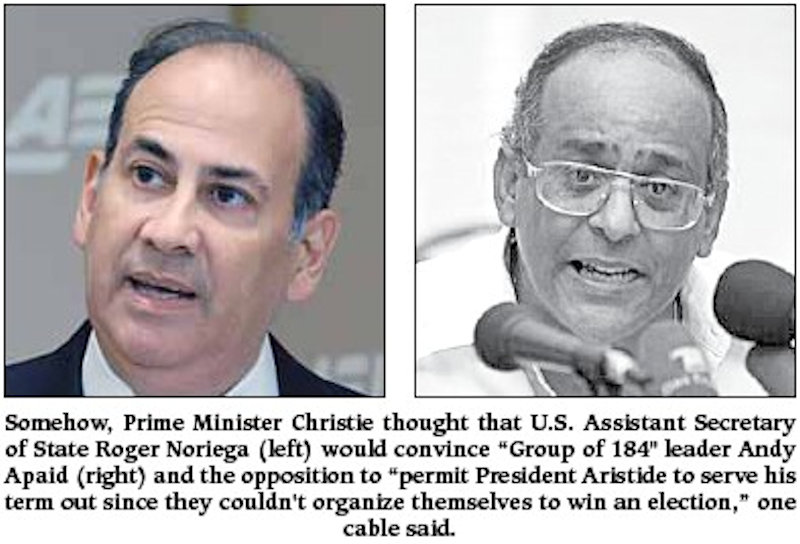 In a cable the very next day, Feb. 24, 2004, Witajewski reported that “The Bahamas seeks the active support of the U.S. as the ‘most important’ member of the Security Council as it engages on a full scale diplomatic press to achieve peace in Haiti” and had “concluded that a peaceful outcome without international intervention is increasingly unlikely.”
In a cable the very next day, Feb. 24, 2004, Witajewski reported that “The Bahamas seeks the active support of the U.S. as the ‘most important’ member of the Security Council as it engages on a full scale diplomatic press to achieve peace in Haiti” and had “concluded that a peaceful outcome without international intervention is increasingly unlikely.”
In short, despite Christie’s sympathy for Aristide’s situation, he “defers to [the] U.S. as ‘Top Dog’,” the Feb. 23 cable concluded.
Encouraging “asylum”
The U.S. also asked the former Haitian Ambassador to the Dominican Republic if he wanted political asylum after he resigned his post on Dec. 18, 2003.
In a Dec. 23, 2003 cable, U.S. Ambassador Hans Hertell reported about his meeting with Ambassador Guy Alexandre who resigned “due to what he described as ‘incompatible principles’ with Aristide’s government” following the Dec. 5, 2003 confrontation at the University of Haiti where “[a]ccording to Alexandre, police officers broke both knees of one of his friends, a vice-rector at a university.” (In fact, it was the university’s rector, Pierre Marie Paquiot, whose legs were injured – not broken – under murky circumstances during a melee between anti-coup popular organizations and pro-coup university students, while the vice-rector, Wilson Laleau, suffered head injuries.)
Prompted by Hertell, Alexandre said he would “not flee to the United States” and “has no plans to seek asylum in the United States for now” but rather “plans to reside in the Dominican Republic” and “get involved in academia.”
“Requesting asylum, [Alexandre] explained, would ‘further complicate Dominican-Haitian bilateral relations’ and would not be in his nor Haiti’s best interests,” Hertell reported.
Had Alexandre requested U.S. asylum, it would have helped Washington’s project of painting Aristide as a political ogre. Instead, Alexandre “criticized opposition groups’ preoccupation with forcing Aristide’s departure without considering the consequences” and “emphasized that Aristide’s exit will not solve Haiti’s socio-economic problems,” Hertell wrote.
Alexandre also criticized the anti-Aristide opposition “for their focus on grabbing power rather than tackling the difficult problems of health, education and infrastructure,” the cable said.
Vatican: “no regret” about coup
However, U.S. diplomats found much more sympathetic ears at the Vatican.
In November 2003, a U.S. political officer from the U.S. Embassy there met with the Vatican’s Caribbean Affairs Office Director Giorgio Lingua, who said that “the Vatican had noticed signs of increased discontent within the Lavalas party” which he felt could best be fanned by “further international pressure, especially from the United States, for increased democratic expression within the country – without directly challenging Aristide’s legitimacy,” wrote U.S. Chargé d’Affaires Brent Hardt in a Nov. 14, 2003 cable.
“Increased democratic expression” was code for increased attacks on Aristide’s constitutional government, which never once limited the “democratic expression” of organizations or media openly calling for its overthrow.
As this and later cables make clear, “challenging Aristide’s legitimacy” and regime change in Haiti were, in fact, the Vatican’s goals. Lingua told the Embassy officer that “effecting change in Haiti should be easier than in Cuba,” wrote Hardt. “Unlike Castro, Lingua observed, Aristide is not ideologically motivated. ‘This is one person – not a system,’ he added.”
But despite U.S. prodding, the Vatican wanted to cloak its collusion. “When asked if the October 16 incident [when anti-coup demonstrators protested at a mass] might prompt the Holy See to raise its voice more forcefully against Aristide’s abuses, Lingua was noncommittal,” Hardt wrote, “saying the Vatican needed to balance pressure on Aristide against a delicate security situation on the ground.” Lingua said “the Haitian bishops needed to tread lightly” because of “Aristide’s unpredictable nature,” according to Hardt.
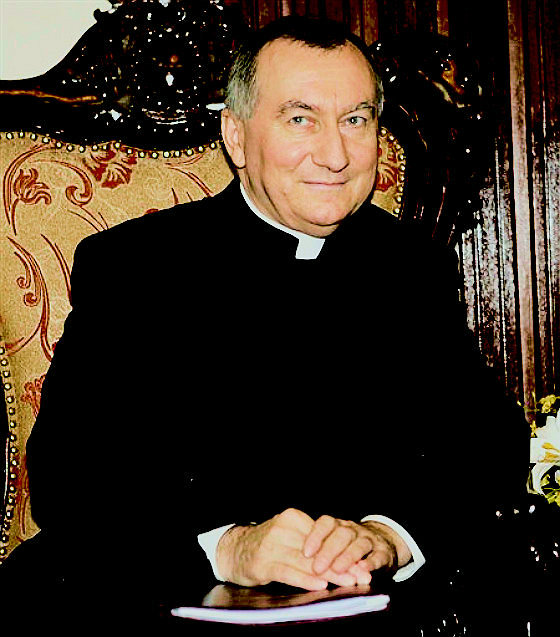
But the real reason the Church hierarchy had to “balance’ and “tread lightly,” the cable makes clear, is because Haiti’s Catholic Church was “divided” between priests supporting Aristide and a hierarchy which did not. (One exception was newly appointed Archbishop Serge Miot, who Washington worried “was too close to the Aristide camp.”) The result was “many people leaving the Church due to disillusionment with its handling of the Aristide crisis,” the cable says.
Progressive liberation theologians, like Father Gérard Jean-Juste, were effectively denouncing Washington’s growing destabilization campaign against Aristide, and the Vatican’s supportive role, and “[a]ccording to Lingua, Aristide’s exploitation of some clergy members for propaganda purposes was taking its toll,” Hardt wrote. “Lingua said Haitians see ‘a Church divided,’ with some clergy supporting the Lavalas party and others against it. Lingua claimed this lack of solidarity fostered disillusionment to the point where people were leaving the Church in increasing numbers.”
The problem was, in Lingua’s own words, “the presence – in fact the omnipresence – of Aristide,” the cable said.
The Vatican came out of the shadows shortly after the coup was finally consummated on Feb. 29, 2004. On Mar. 5, 2004, U.S. Ambassador to the Vatican James Nicholson wrote a cable reporting that the Holy See had “no regret at Aristide’s departure, noting that the former priest had been an active proponent of voodoo.”
Nicholson learned this from Embassy personnel who met with the Vatican’s Deputy Foreign Minister Pietro Parolin, although “since February 29, the Vatican has had no official public comment on Aristide’s resignation.”
Nonetheless, “even before Aristide’s departure, Pope John Paul II had appealed to Haitians ‘to make the courageous decisions their country required,’ and had urged the international community and aid organizations to do what they could to avert a greater crisis,” Nicholson wrote. “This was seen as a veiled reference to Aristide’s leaving power.”
At that time, Lingua also told the Embassy that the Vatican “saw no other way out of the crisis and thought the former priest had to go.”
The Vatican understood it had an important role to play in consolidating the coup, saying it was “ready to work with a new transitional Haitian administration to ensure a peaceful restoration of order,” Nicholson wrote. Rome told its bishops “to exert a calming influence on the populace,” which was outraged by the coup. But the Pope also understood that his missionaries needed some steel behind their gold crosses so called for “an international force [to] quickly restore order in Haiti.”
Managing the backlash
In the days even before the coup was consummated, the governments which backed it – the U.S., France and Canada – began to insert “an international force” of several thousand soldiers. They militarily occupied Haiti for the three months from March 1 until May 31, 2004, and on June 1, the 9,000-strong Brazilian-led United Nations Mission to Stabilize Haiti (MINUSTAH) took over “restoration of order.”
But there was a backlash of indignation against the coup and occupation from many Latin American and Caribbean nations. CARICOM issued a Mar. 3 statement which expressed “dismay and alarm” about the coup, noting the “public assertions made by President Aristide that he had not demitted office voluntarily” and demanding “an investigation under the auspices of the United Nations to clarify the circumstances leading to his relinquishing the Presidency.” CARICOM, which had proposed an international force to protect Aristide’s government from “rebels” and “restore order,” refused to take part in the post-coup Multilateral Interim Force and called for Aristide’s “immediate return.”
CARICOM also “questioned the legality of the American-backed move to install Mr [Boniface] Alexandre as president,” reported The Economist on Mar. 4. CARICOM Chairman and Jamaican Prime Minister P.J. Patterson said that the coup “sets a dangerous precedent for democratically elected governments anywhere and everywhere, as it promotes the removal of duly elected persons from office by the power of rebel forces.”
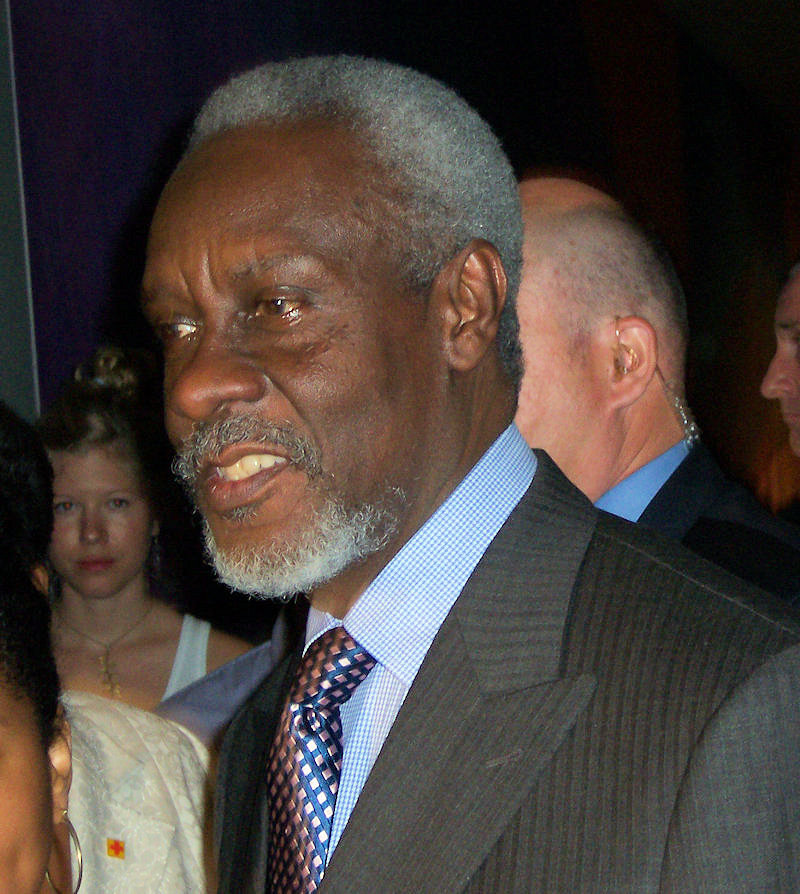
A Mar. 9 cable by Nassau’s Chargé d’Affaires Witajewski provides a glimpse of the damage control that Washington carried out in the face of such outrage. Witajewski reports on a Mar. 8 meeting that he and his Political Officer had with Dr. Eugene Newry, the Bahamian Ambassador to Haiti.
Contrary to Prime Minister Christie and Foreign Minister Mitchell, Ambassador Newry was favorably disposed toward the coup. Perhaps due to his many “contacts with the opposition,” Newry was “pleasantly surprised with the transition now occurring” in Haiti and thought “it was a good sign that the Haitian people overall had focused their mistrust and dislike on the ex-President,” although he did “fear […] that Aristide’s support network would re-group in time for the next set of elections while the Opposition coalition would fall apart fall once the ‘negative force,’ i.e., Aristide, disappeared from the scene as an effective player,” wrote Witajewski. (Newry also “did not think that Aristide’s attempts to regain support via press encounters in the Central African Republic [where he was exiled at the time] would impact on future Haiti developments.”)
Accordingly, Newry “downplayed incendiary phrases in Caricom’s statement on Haiti such as expressing ‘alarm and dismay’ as matter-of-fact descriptions of members’ disappointment” and “claimed that Caricom is not ‘angry’ with the U.S. involvement in the departure of Aristide, but rather was ‘surprised’ by the abrupt decision-making, and Caricom’s lack of involvement,” the cable said.
Newry also predicted “that Caricom will be satisfied as long as their 10-point action plan remains the basis for post-Aristide Haiti.” (Washington set up a “Tripartite Commission” and a “Council of Wise Persons” as earlier proposed by CARICOM.) Newry “concluded [that] Caricom needs to get over its pique because ‘like a river, things must move on’, and he understood that Haiti cannot advance without the help that only the United States with the ancillary support of other ‘major powers’ such as Canada and France could deliver,” the cable said.
Newry told the Embassy what it wanted to hear, but Witajewski, in his comments, also was aware that the Bahamian “was perhaps overreaching in trying to put a positive spin on Caricom’s March 3 statement on Haiti and reflecting more of the real politik position that The Bahamas takes regarding Haitian migration than the more ideological position of some of the other, less affected, Caricom members.”
CARICOM gets real
The Christie government’s “realism,” as Witajewski called it in this cable, was apparent in another from Apr. 6, 2004, when the Ambassador reported on Foreign Minister Mitchell’s backpedaling during a Mar. 29 lunch meeting.
Mitchell “pursued his agenda of downplaying the consequences of a division between Caricom and the United States on Haiti,” Witajewski wrote. “Underlying many of Mitchell’s arguments was the premise that Caricom/The Bahamas as small countries take (and are entitled to take) principled stands while the United States necessarily engages in real politik.”
Mitchell said that northern Caribbean nations like the Bahamas are “cognizant of the importance of their relations with the United States and thus are more careful in balancing their interests with Caricom and the U.S.” while southern Caribbean nations “are guided by political agendas.”
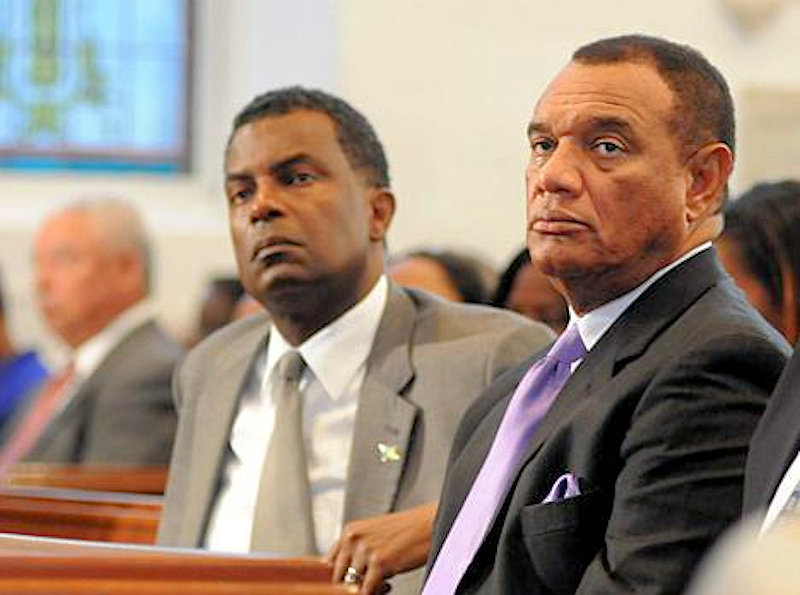
Sensing he had his guest on the defensive, Witajewski asked Mitchell “to clarify Caricom’s call for an investigation into the circumstances of Aristide’s resignation, [and] Mitchell sought to downplay its significance,” the cable said. Mitchell “said that he personally envisioned the ‘investigation’ as equivalent to resolution of a ‘routine credentials challenge’ to a government such as occurs at the UNGA [U.N. General Assembly] or another committee.”
However, Mitchell did have the temerity to say “that the United States overreacted to Jamaica’s offer to let ex-President Aristide reside in the country and to Caricom’s declarations,” Witajewski wrote. “He appeared to be arguing that Caricom was entitled to express its views and not necessarily be held accountable for them. Mitchell also claimed that despite Caricom’s verbal shots at the United States over recent events in Haiti, there would be little net impact on overall U.S.-Caricom relations… as long as the United States didn’t ‘overreact.’”
Mitchell upped the ante when he “insisted that the United States should not be concerned with, or opposed to, Aristide’s presence in the Caribbean,” a reference to Bush administration officials’ remarks that Aristide should get out of Jamaica and the hemisphere. Mitchell “argued that a perceived ‘Banishing Policy’ has racial and historical overtones in the Caribbean that reminds inhabitants of the region of slavery and past abuse.”
Unfazed, Witajewski “inquired on what would happen if Aristide were to meddle with Haitian internal affairs and give his supporters the impression that he is still a player in the future of Haiti,” which he had every right to do. But Mitchell immediately became defensive and “was emphatic that Jamaica will not allow Aristide to play such an intrusive role and would ‘deal’ with Aristide if such a situation were to arise,” the cable said.
Keeping the pressure on
Perhaps also afflicted with the “realism” that governed Bahamian policy, other countries offered their support to the U.S. campaign against Aristide. For example, in a Nov. 22, 2004 cable, Guatemala’s acting Foreign Minister Marta Altolaguirre told the Embassy there that she “agreed wholeheartedly with [the] U.S. assessment” of Haiti and “volunteered that her personal view was that Aristide had been a ‘disaster’ and could play no useful role in Haiti’s future.”
Nigeria, after “consultations” with Washington, also “offered Haitian ex-president Aristide refuge in Nigeria for a few weeks before moving on to another destination,” a Mar. 23, 2004 cable from the U.S. Embassy in Abuja explains. The cable notes that Nigeria “has a history of offering asylum to fleeing leaders” from collapsed African dictatorships (like Liberia’s fallen strongman Charles Taylor). This was a transparent attempt to associate Aristide with such leaders.
After Aristide left Jamaica for exile in South Africa on May 30, 2004, the US government worked overtime to keep him out of Haiti and even the hemisphere, rendering him a virtual prisoner-in-exile, even though the Haitian Constitution and international law stipulate that every Haitian citizen has the right to be in his homeland.
When Dominican President Lionel Fernandez suggested in a statement at a hemispheric conference nine months after the coup that Aristide should return and play a role in Haiti’s democracy, the United States reacted angrily, saying in a cable that Fernandez had “put a big front wrong in advocating the inclusion in the process of former president Jean Bertrand Aristide.”
The US Ambassador to the DR “admonished” Fernandez “in a pull-aside at a social event.”
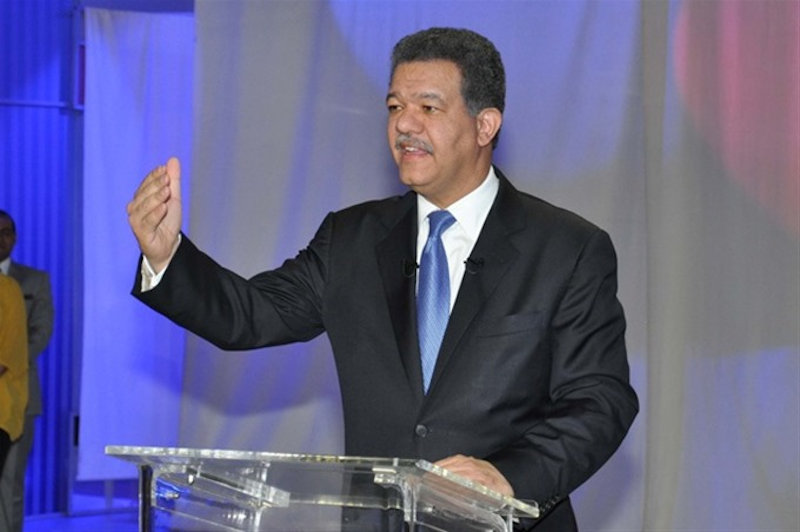
“Aristide had led a violent gang involved in narcotics trafficking and had squandered any credibility he formerly may have had,” US Ambassador Hertell told him, according to a Nov. 16, 2004 cable.
“Nobody has given me any information about that,” Fernandez replied.
No charges were ever filed against Aristide for drug trafficking, although his lawyer Ira Kurzban asserts Washington has tried. “The United States government has spent, literally, tens of millions of taxpayer dollars trying to pin something, anything on President Aristide,” Kurzban told Pacifica’s Flashpoints Radio earlier this month. “They’ve had an ATF investigation, a tax investigation, a drug investigation, and now apparently some kind of corruption investigation. The reality is they’ve come up with nothing because there is nothing.”
Under the heading “Aristide Movement Must Be Stopped” in an Aug. 2, 2006 cable, US Ambassador to Haiti Janet Sanderson described how former Guatemalan diplomat Edmond Mulet, MINUSTAH’s head, “urged U.S. legal action against Aristide to prevent the former president from gaining more traction with the Haitian population and returning to Haiti.”
At Mulet’s request, UN Secretary General Kofi Annan urged South Africa’s President “to ensure that Aristide remained in South Africa,” where Aristide and his family were living under an arrangement with the government there.
In 2005, the Lavalas Family planned large demonstrations to mark Aristide’s birthday. The US Ambassador to France met with the French diplomatic official Gilles Bienvenu in Paris to discuss the possibility of Aristide’s return.
“Bienvenu stated that the GOF [Government of France] shared our analysis of the implications of an Aristide return to Haiti, terming the likely repercussions ‘catastrophic’,” wrote U.S. ambassador Craig Stapleton. “Initially expressing caution when asked about France demarching the SARG [conveying the message to the South African government], Bienvenu noted that Aristide was not a prisoner in South Africa and that such an action could ‘create difficulties.’”
UN Secretary General Kofi Annan urged South Africa’s President “to ensure that Aristide remained in South Africa.”
Stapleton swiftly overcame Bienvenu’s reluctance. Bienvenu agreed to relay U.S. and French “shared concerns” to the South African government, under the “pretext” (i.e. veiled threat) that “as a country desiring to secure a seat on the UN Security Council, South Africa could not afford to be involved in any way with the destabilization of another country.”
The Frenchman went even further, according to the Jul. 1, 2005 cable: “Bienvenu speculated on exactly how Aristide might return, seeing a possible opportunity to hinder him in the logistics of reaching Haiti,” Stapleton wrote. “If Aristide traveled commercially, Bienvenu reasoned, he would likely need to transit certain countries in order to reach Haiti. Bienvenu suggested a demarche to CARICOM [Caribbean Community] countries by the U.S. and EU to warn them against facilitating any travel or other plans Aristide might have. He specifically recommended speaking to the Dominican Republic, which could be directly implicated in a return attempt.”
Five days later in Ottawa, two Canadian diplomatic officials met with the U.S. Embassy personnel. “‘We are on the same sheet’ with regards to Aristide,” one Canadian affirmed, according to the Jul. 6, 2005 cable. “Even before these recent rumors, she said, Canada had a clear position in opposition to the return of Aristide.”
Canada shared the message with “all parties… especially the CARICOM countries,” as well with South Africa.
But “the South Africans reportedly questioned whether it is fair to encourage Lavalas to participate in the elections without their most important leader being on the ground,” the cable said. “They are not convinced of the good will of those who would exclude him being there.”
Aristide’s exclusion from Haiti during post-coup elections was essential, because Washington was fully aware of his continuing popularity. U.S. Ambassador James Foley admitted in a confidential Mar. 22, 2005 cable that an August 2004 poll “showed that Aristide was still the only figure in Haiti with a favorability rating above 50%” and thus “Aristide’s shadow continues to hang over the movement.”
So the Embassy’s dilemma was how to keep Aristide in exile but still mobilize the Lavalas base because, as Foley noted, the “degree to which the Lavalas constituency participates in the election will be a large factor in the legitimacy of the elections, and we are therefore following developments inside the movement closely.” They found an answer to their dilemma in the man once considered Aristide’s “twin,” René Préval.
Préval remains bitter
The de facto post-coup Haitian government that followed Aristide and persecuted his supporters resolutely opposed his return. Then René Préval, formerly Prime Minister in 1991 under Aristide, emerged as the frontrunner to become president (for the second time) in Haiti’s 2006 election. U.S. Chargé d’Affaires Timothy Carney reassured Washington that “[i]n all his private dealings, Préval has consistently rejected any further association with Aristide and Lavalas, and bitterly denounced Aristide in conversations with the Charge and other Embassy officers.”
In his Dec. 14, 2005 profile of Préval, he commented: “We see no credible evidence that Préval is prepared to reconcile with Aristide or Lavalas leaders.”
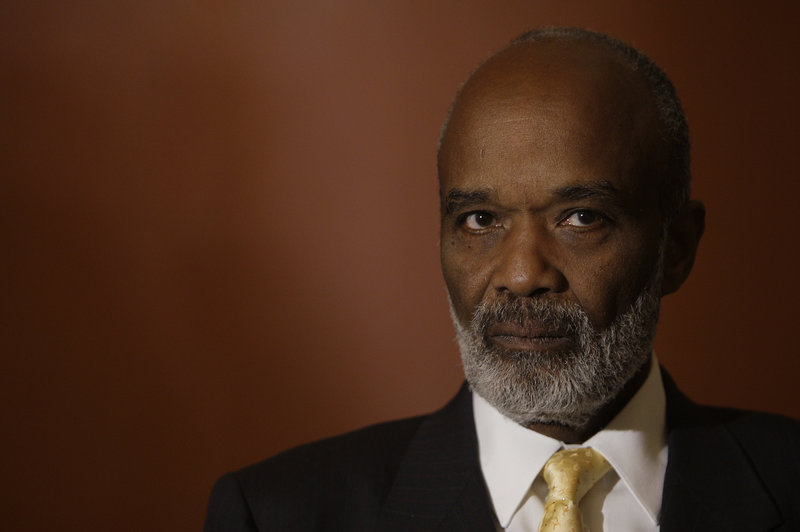
Publicly, Préval maintained that Aristide was free to exercise his constitutional right to return to Haiti. Lavalas supporters voted for him in droves, expecting he would facilitate Aristide’s homecoming. He did not.
The next year, Préval began to worry that Lavalas would dominate the next legislative election, take control of the government, and pave the way for Aristide’s return. He met with Marc Bazin, a former World Bank economist, presidential candidate, and long-time reliable partner of the U.S. Embassy, who relayed the conversation to U.S. Chargé d’Affaires Thomas Tighe.
“Préval seemed preoccupied with Aristide, asking Bazin for his advice,” Tighe wrote in a Sep. 7, 2006 cable. “(Bazin suggested that Préval travel to South Africa to tell Aristide personally that the political situation was too delicate for his return. Préval responded that ‘the foreigners’ would never stand for his visiting Aristide. This was, we trust, Préval’s way of discounting a monumentally bad piece of advice from Bazin.)”
When rumors swirled that Aristide would relocate to Venezuela, Préval told U.S. Ambassador Sanderson “that he did not want Aristide ‘anywhere in the hemisphere,’” she noted in an Oct. 3, 2008 cable. The U.S. was concerned but did not believe the rumors to be credible.
There was no change in Washington’s policy of blocking Aristide’s return with the Obama administration’s arrival. Aristide himself held a press conference the day after the Jan. 12, 2010 earthquake saying he wanted to return to help with Haiti’s recovery. “As far as we are concerned, we are ready to leave today, tomorrow, at any time to join the people of Haiti, share in their suffering, help rebuild the country, moving from misery to poverty with dignity,” he said, close to tears.
Vatican joins the fight
The U.S. Embassy’s Deputy Chief of Mission (DCM) met with his counterpart at the Vatican to discuss the earthquake and relief efforts days later. A Jan. 20, 2010 cable reports, “In discussions with DCM over the past few days, senior Vatican officials said they were dismayed about media reports that deposed Haitian leader — and former priest — Jean Bertrand Aristide wished to return to Haiti… The Vatican’s Assesor (deputy chief of staff equivalent), Msgr. Peter Wells, said Aristide’s presence would distract from the relief efforts and could become destabilizing.”
Then the Vatican’s Undersecretary for Relations with States, Msgr. Ettore Balestrero, called Archbishop Bernardito Auza in Haiti, who “agreed emphatically that Aristide’s return would be a disaster.” The Vatican “then conveyed Auza’s views to Archbishop Greene in South Africa, and asked him also to look for ways to get this message convincingly to Aristide. DCM suggested that Greene also convey this message to the SAG [South African government].”
U.S. efforts to block Aristide from returning to Haiti continued up until the day he was heading to the jet that would fly him back to Port-au-Prince. UN Secretary Ban-Ki Moon and President Obama both phoned South African President Jacob Zuma asking that he stop Aristide from leaving South Africa before the Mar. 20 run-off election, according to the Miami Herald.
“Former President Aristide has chosen to remain outside of Haiti for seven years,” State Department spokesperson Mark Toner told reporters days before Aristide boarded his plane, echoing the Bush administration’s claim that Aristide had “chosen” to leave Haiti in the first place.
“To return this week could only be seen as a conscious choice to impact Haiti’s elections,” Toner said, as if Aristide did not have the right to do so while the U.S., which virtually dictated the results, did. “We would urge former President Aristide to delay his return until after the electoral process has concluded, to permit the Haitian people to cast their ballots in a peaceful atmosphere. Return prior to the election may potentially be destabilizing to the political process.”
A hero’s welcome
Aristide’s return on Mar. 18 did nothing of the sort. “The problem is exclusion, the solution is inclusion,” Aristide said during a brief return speech at the airport after landing. And then he made his only reference, however oblique, to the election from which his party was barred: “The exclusion of Fanmi Lavalas is the exclusion of the majority.”
Two days later the second round of Haiti’s election went off without a hitch, but with record low participation by Haitians. Some polling stations in Port-au-Prince were empty, with stacks of ballot sheets sitting around, hours before they closed. Less than 24% of registered voters went to their polls.
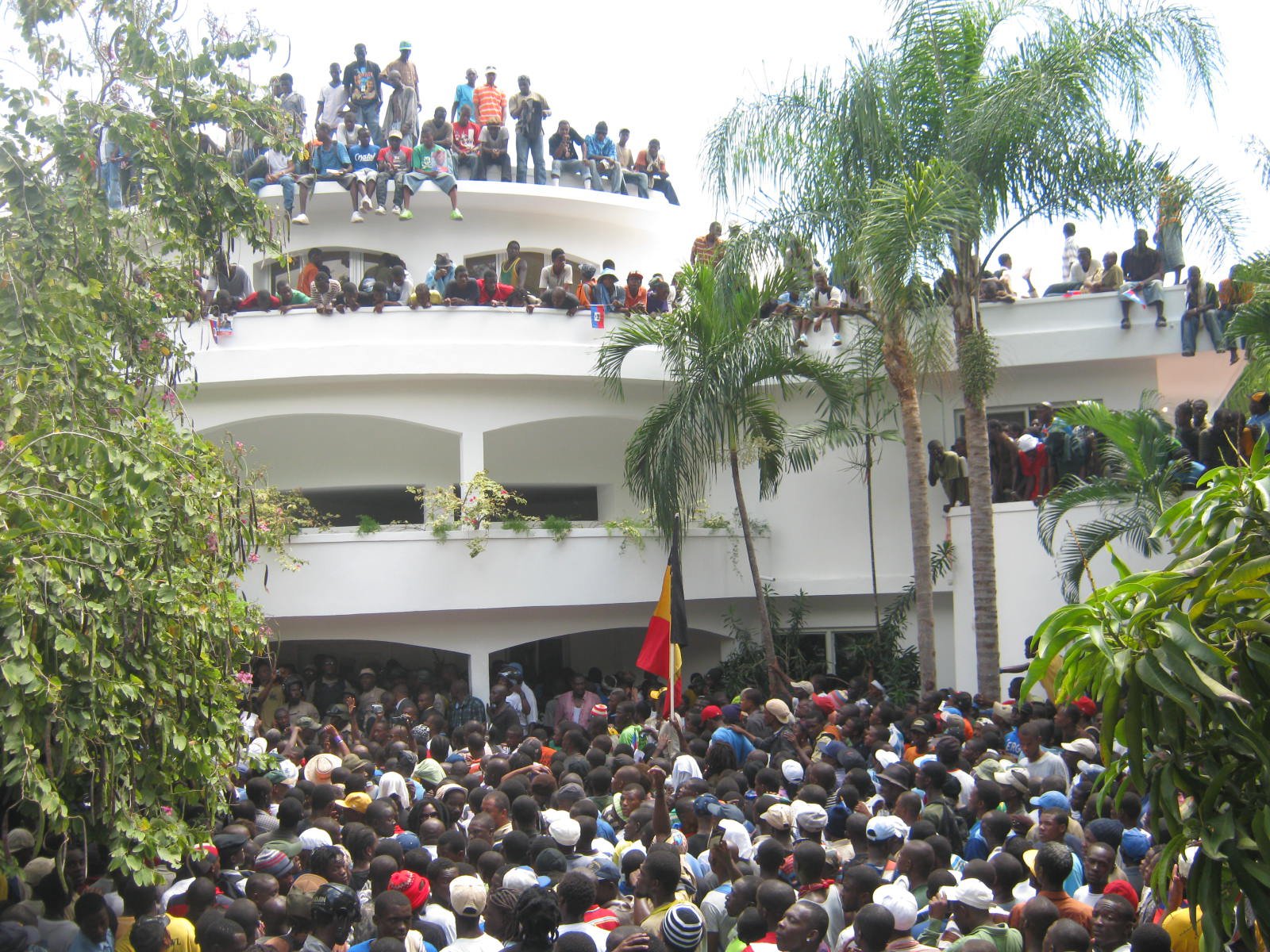
As the tropical sun came out the morning of Aristide’s return in Port-au-Prince, nothing seemed out of the ordinary. A 42-year-old mechanic, Toussaint Jean, had come from the opposite end of the city with a few friends to stand outside the airport’s chain-link fence.
“The masses of people haven’t really mobilized,” he said, “because for three days they’ve been saying he’s coming, but the Americans are putting pressure, and we think he can’t return soon. Today you don’t see very many people. The people are doubting – is he coming, is he not coming?”
Nonetheless, by the time Aristide had touched down and finished his speech, perhaps 10,000 people (estimates vary) had gathered outside the airport in an exuberant demonstration. They jogged alongside his motorcade waving Haitian flags and placards bearing Aristide’s visage, then scaled the wall surrounding Aristide’s home and poured into its grounds until there was no room left to move. The crowd even climbed the house’s walls and covered the roof.
Sitting in an SUV just 20 feet from the door to his hastily repaired but mostly empty house (“rebels” had ransacked it after the coup), Aristide and his family waited until a crew of Haitian policemen managed to clear what resembled a pathway through the crowd. First his wife and two daughters emerged from the car and dashed inside the home.
Finally Aristide, diminutive in a sharp blue suit, stood up in the car doorway and waved. The crowd roared in excitement and surged around him. The path to the door vanished. His security grabbed him and shouldered their way through the sea of humanity until they got him to the house’s door, through which he popped like a cork, clutching his glasses in his hands.
After a coup, kidnapping, exile, diplomatic intrigue, and his rapturous welcome, Aristide was finally back home.











[…] Haiti – on Mar. 18, 2011. Joined again by Goodman, as well as actor Danny Glover, the delegation delivered the former president and his wife Mildred from their long exile to a cheering multitude which accompanied them back to Aristide’s home in […]
[…] Haiti – on Mar. 18, 2011. Joined again by Goodman, as well as actor Danny Glover, the delegation delivered the former president and his wife Mildred from their long exile to a cheering multitude which accompanied them back to Aristide’s home in […]
[…] – le 18 mars 2011. Rejoints par Goodman, ainsi que l’acteur Danny Glover, la délégation a livré l’ancien président et son épouse Mildred de leur long exil à une foule en liesse qui les a accompagnés jusqu’à la maison d’Aristide […]
[…] Tracy Kidder showed consistent popular support for Aristide. Six months after the coup, a poll showed “that Aristide was still the only figure in Haiti with a favourability rating above 50 percent” […]
[…] Tracy Kidder showed consistent popular support for Aristide. Six months after the coup, a poll showed “that Aristide was still the only figure in Haiti with a favourability rating above 50 percent” […]
[…] Tracy Kidder showed consistent popular support for Aristide. Six months after the coup, a poll showed “that Aristide was still the only figure in Haiti with a favourability rating above 50 percent” […]